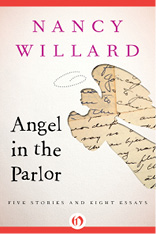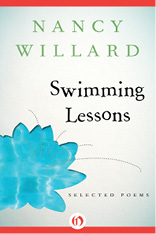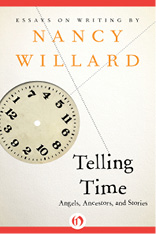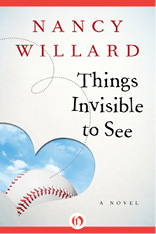Things Invisible to See (32 page)
Read Things Invisible to See Online
Authors: Nancy Willard
“Matty just walked Mrs. Henrietta Bacco,” remarked Death.
“I’m up now,” said Willie.
“I give good benefits, Willie,” said Death. “Wonderful vacations. Willie, I want
you.
Join my club and see the world. I’ve got a job for you.”
“What kind of job?”
“I want you to keep my records, plead my cause. Snuff out hope wherever you find it. It’s what you’ve always done, Willie. And you can start right this minute.”
“No, thanks,” said Willie.
“Willie, last night Mr. Jackson was arrested. He named you.”
“He named me?”
“There will be a trial, of course. These are patriotic times. You won’t get off easily.”
The pilot broke the silence.
“The fuel gauge has been reading empty for the last hour,” he observed. “According to my instruments, we should all be dead.”
None of them was ever to know for certain exactly what happened next. The pilot said it was the clouds; they played tricks on you. Made you think you were seeing whole cities, armies. The copilot blamed it on magnetic currents: there were currents you could hit up there that made all your instruments malfunction.
Only Hal believed his eyes. The engines were silent. But under the wing he saw the ghostly shapes of children, animals, birds, bearing them up.
Willie struck out, and the crowd roared its grief:
“Awwwwww.
”
“You see, Willie,” murmured Death as Willie walked toward the dugout. “You have a calling.”
“What’s the pay?” asked Willie.
“Every living thing in the world shall be yours.”
“Then I’m your man,” said Willie. “But I’m not packed.”
“No need to pack,” said Death. “Everything you’ll ever need is furnished.”
From his pocket he drew a coin—a skull on one side, a man in a winged cap on the other—and slipped it into Willie’s hand. “Come.”
“The game’s not over,” said Willie. “And you’re winning.”
“We’re losing,” said Death. “Can’t you see? Do you think Gehrig and Waddell and McGinnity and Jennings couldn’t hit if they wanted to? Do you think Matty had to walk Mrs. Bacco? They want the living to win. Even the umpire wants the living to win
They remember how it was. All the pain, all the trouble—they’d choose it again—they’d go extra innings into infinity for the chance to be alive again.”
It seemed to Helen that she heard Hal singing, heard him so clearly behind the murmur of the crowd that she could even make out the words:
“When we’ve been there ten
thousand years
Bright shining as the sun—”
She looked around for Grandpa, knowing full well he was in the bleachers. It was Hal’s voice, she was sure of it now, and her heart fluttered a little. She had not heard any sound that far off since the last snowfall. All spring she’d heard the usual sounds, the chirp of crickets but not the silence of crickets; the drumming of rain on the roof but not the plotting of rain in the clouds. And now she heard Hal’s voice drawing nearer and nearer like an approaching parade.
“What does it mean?” she wondered, and Father Legg next to her said, “It’s a miracle,” as Clare swung and connected.
The next moment Helen was shouting at him. “Who is that coming out on the field?”
It was a figure to make the dead sit up and take notice: a tall woman in a blue raincoat, a pink babushka and slippers, and as she ran she threw off her clothes, one garment at a time. First the raincoat; the hospital gown she wore underneath did not even reach to her knees. When the babushka was tossed away, the players gaped in astonishment, and Clare, digging her toe into first base, gave a shout.
“It’s Ben!”
In the ward, the announcer’s voice crackled with excitement.
“Folks, that’s two on for the Rovers, only one away. A home run now would tie it up, and ladies and gentlemen, coming to bat”—his voice broke—“is Ben Harkissian!”
“Who?”
exclaimed Charley.
“Listen!” hissed Ginny.
The room grew still, as still as the day before creation.
“Here’s the windup,” said the announcer, “and the pitch.”
In Paradise, the Lord of the Universe tosses a green ball which breaks into a silver ball which breaks into a gold ball, and a small plane lands safely at Willow Run and Hal Bishop climbs out, singing for joy. He is too far away to hear the crack of the bat, like a tree falling all alone in the forest. But he hears the distant cheering. Clare starts running and Ben runs after her as they round the bases, past the living and the dead, heading at top speed for home.
Nancy Willard grew up in Ann Arbor, Michigan. She has written two novels, seven books of stories and essays, and twelve books of poetry, including
The Sea at Truro
(2012). A winner of the Devins Memorial Award, she has received NEA grants in both fiction and poetry. Her book
Water Walker
was nominated for the National Book Critics Circle Award, and she won the Newbery Medal for
A Visit to William Blake’s Inn
. Willard is an emeritus professor at Vassar College.

Eric Lindbloom
All rights reserved, including without limitation the right to reproduce this book or any portion thereof in any form or by any means, whether electronic or mechanical, now known or hereinafter invented, without the express written permission of the publisher.
This is a work of fiction. Names, characters, places, events, and incidents either are the product of the author’s imagination or are used fictitiously. Any resemblance to actual persons, living or dead, businesses, companies, events, or locales is entirely coincidental.
Grateful acknowledgment is given to Times Books for permission to reprint an excerpt from “Lay Dis Body Down” from
American Negro Folklore
by J. Mason Brewster, Copyright © 1968 by J. Mason Brewster. Reprinted by permission of Times Books/ The New York Times Book Co., Inc., a division of Quadrangle Books.
The author is indebted to Harold F. Dixon’s “Three Men on a Raft” (
Life,
April 6, 1942) for background material to the chapter entitled “Birdlight.”
Copyright © 1984 by Nancy Willard
Cover design by Kathleen Lynch
978-1-4804-8150-3
This edition published in 2014 by Open Road Integrated Media, Inc.
345 Hudson Street
New York, NY 10014







